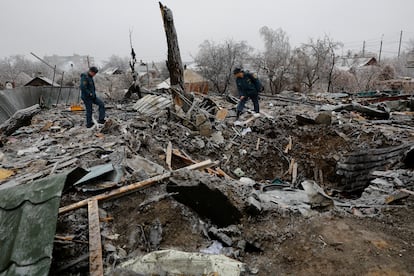Comparative Wars
There should be little doubt about the legitimacy of Ukraine’s response to Russia’s aggression, and Israel’s to the Hamas attacks. The problem lies in the limits

Comparisons are odious, but they hold up reasonably when it is hatred that fuels the terms being compared. Vladimir Putin’s soldiers, who had their fill of killing and torturing civilians in Bucha in March 2022, and the Hamas militiamen who razed kibbutzes, kidnapped old people, children, and women and set about murdering those who fled. The bombs dropped on Kramatorsk station and the Mariupol theater, and those dropped on Gaza City and Khan Younis. Putin takes the cake because he invites comparisons with the worst of all sides.
It is not so easy to compare when it comes to the right of defense that everyone claims. There should be little doubt about the legitimacy of Ukraine’s response to Russia’s aggression, and Israel’s to the Hamas attacks. The problem lies in the limits. For Ukraine, if its forces can achieve it, these lie in the expulsion of the Russian army from its sovereign, internationally recognized territory. The case of Israel is thornier: to liquidate Hamas, without doubt, but after defining what such liquidation means, how long it might last, and what price there will be to pay in terms of lives, especially those of hostages and innocent Palestinian citizens.
The proportionality of the means employed and even the real objective pursued are debatable. If it is the destruction of the Strip, as can be surmised from the annexationist expressions of many members of the Israeli government, this is where Putin comes in again. First, destroy, and then annex, in violation of international law: Greater Russia and Greater Israel twinned. As an alibi, the precedent established by George W. Bush with his war against terrorism, which claimed to be based on the right of defense against a real terrorist attack — that of 9/11 — and an invented threat of aggression — that of the non-existent weapons of mass destruction — weighs heavily. Putin still pushes the narrative of the aggression represented by the enlargement of NATO and the installation of a regime in Kyiv which he likens to the Nazis.
The comparative flow is inexhaustible. War crimes, for example, have been committed by everyone, from the low intensity of the accusations against Ukraine to the seriousness of the Russian invasion, as well as the Israeli siege and bombardment of Gaza, while not forgetting Hamas, of course. All fingers, including Putin’s, point to the enemy as guilty of genocide. Although Israel seems to own the accusatory brand, painfully acquired under Hitler’s Germany, the horror of the persecution and industrial extermination of Europe’s Jews has little to do with the primitive bestiality of the October 7 pogrom. It is only logical that the grandchildren of those who perished in the concentration camps should link that systematic slaughter of yesteryear with the hatred they now arouse in their Palestinian neighbors.
Hatred is everywhere and without it there is no explanation for the cruelty of these wars and why they break out.
Sign up for our weekly newsletter to get more English-language news coverage from EL PAÍS USA Edition
Tu suscripción se está usando en otro dispositivo
¿Quieres añadir otro usuario a tu suscripción?
Si continúas leyendo en este dispositivo, no se podrá leer en el otro.
FlechaTu suscripción se está usando en otro dispositivo y solo puedes acceder a EL PAÍS desde un dispositivo a la vez.
Si quieres compartir tu cuenta, cambia tu suscripción a la modalidad Premium, así podrás añadir otro usuario. Cada uno accederá con su propia cuenta de email, lo que os permitirá personalizar vuestra experiencia en EL PAÍS.
¿Tienes una suscripción de empresa? Accede aquí para contratar más cuentas.
En el caso de no saber quién está usando tu cuenta, te recomendamos cambiar tu contraseña aquí.
Si decides continuar compartiendo tu cuenta, este mensaje se mostrará en tu dispositivo y en el de la otra persona que está usando tu cuenta de forma indefinida, afectando a tu experiencia de lectura. Puedes consultar aquí los términos y condiciones de la suscripción digital.









































